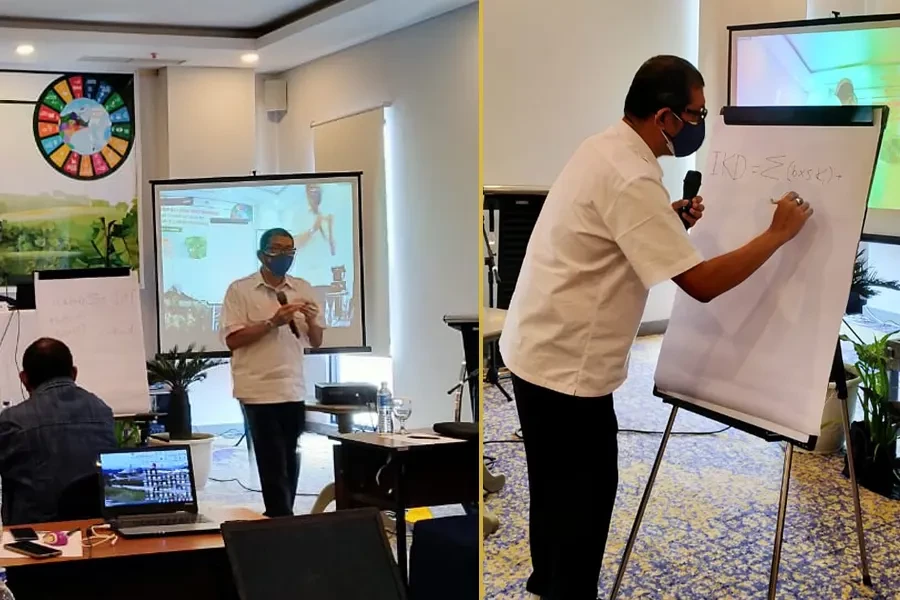"Involving various universities in Papua Province such as Universitas Cendrawasih Jayapura, Universitas Musamus Merauke and Universitas Ottow Geissler Jayapura, is a strategic step to develop the Strategic Environmental Studies (KLHS/Kajian Lingkungan Hidup Strategis) in processing numerous regional planning documents that require KLHS as the mandatory instrument in the procedures and mechanisms", said Mr Marthinus Wattimena, the Provincial Representatives of the Global Green Growth Institute (GGGI) in his closing remarks of the Technical Guidance of Validation and Training Course for Validation Team and Experts in KLHS Development in Papua Province. This technical guidance is a collaboration between the Indonesian Ministry of Environment and Forestry, the Papua Provincial Office of Forestry, and Environment Service and GGGI and was held on 5-9 July 2021 at Suni Hotel and Convention Abepura, Jayapura.
The Head of the Papua Provincial Office of Forestry and Environment Service, Mr Jan Jap Ormuseray said that his institution and GGGI agreed to increase the capacity of human resources, including document creators, working groups, or validators. Mr Jan further stated, “The key is of this program is our hard work. I do hope that in the near future we can guarantee the quality of the KLHS documents that we produced and that we can run the program in accordance with the government's program. I do also hope that we can collaborate with other stakeholders".
The GGGI Environment Policy Advisor M. Taswin Munier said that this technical guidance was a series of three training courses, which have been implemented since April 2021 to increase the capacity of Papua provincial officials in validating KLHS reports for various policies, plans, programs of Papua Province, and to fulfill the necessary KLHS document creators from local univesities. Mr Taswin further emphasized that the capacity building of human resources by providing training to drafters from local universities is aimed to assist the Papua Provincial Government in integrating the principles of sustainable development and meeting the target of reducing regional emission as stated in the regional mid-term development plan (RPJMD) and the spatial planning (RTRW) and other relevant detailed plans. Mr Taswin also stated that currently, GGGI had signed a Memorandum of Understanding (MoU) with Universitas Cendrawasih, which will be followed up with a Cooperation Agreement (PKS), which will include subsequent training courses in similar subjects and elevating the capacity of the academic community in terms of green growth approaches in planning and activities. development.
In addition to the KLHS, he said, there are RPPLH (environmental protection and management plan), DDDTLH (environmental carrying capacity), IELH (environmental economic instruments), emission reduction programs based on NDC (nationally-determined contribution), spatial-based planning, green investment and others. With the availability of a local qualified KLHS document creator, the collaboration between the local government and local universities will be even closer, and the role of the universities will be more vital and strategic. Mr Taswin further concluded that this person is not only functioned as a provider of knowledge and skills but also as a regional environmental database manager, who will collect, manage and analyze regional databases for the benefit of development planning that is more systematic, based on the carrying capacity of the environment and of course sustainable.
Mr Yehuda Hamokwarong SPd, MSc, the lecturer of Geography Education of Universitas Cendrawasih, that he learned new knowledge from this technical guidance and that he is ready to be involved in the preparation of the KLHS document. He further expressed his expectation of more detailed training courses in the universities, especially to understand KLHS documents, such as the regional mid-term development plan (RPJMD) and spatial planning (RTRW).
(Written by Makawaru da Cunha I from PAPUAinside.com, JAYAPURA, translated into English by Sri Ismawati Soerianegara from SEAMEO BIOTROP)
 Monday, 12 July 2021 on 10:43am
Monday, 12 July 2021 on 10:43am
